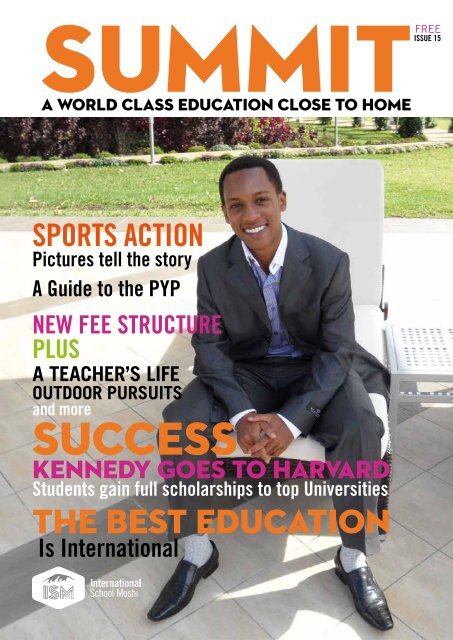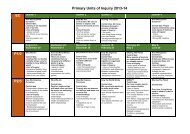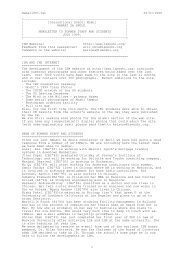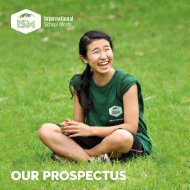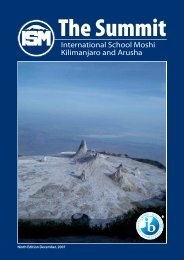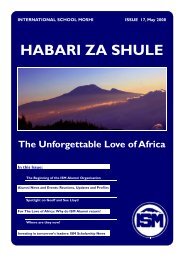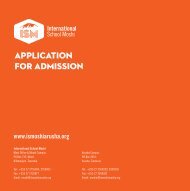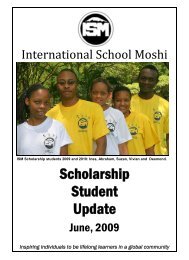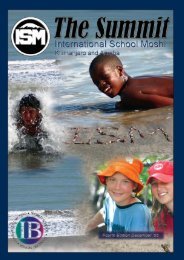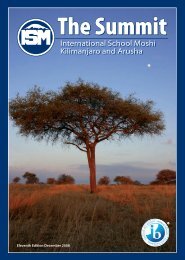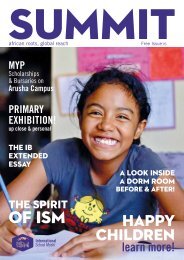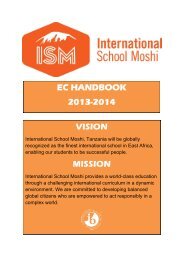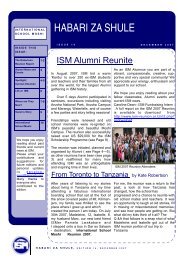June 2012 (5Mb) - International School Moshi
June 2012 (5Mb) - International School Moshi
June 2012 (5Mb) - International School Moshi
Create successful ePaper yourself
Turn your PDF publications into a flip-book with our unique Google optimized e-Paper software.
Summit<br />
FREE<br />
ISSUE 15<br />
A world class education close to home<br />
SPORTS ACTION<br />
Pictures tell the story<br />
A Guide to the PYP<br />
NEW FEE STRUCTURE<br />
PLUS<br />
A TEACHER’S LIFE<br />
OUTDOOR PURSUITS<br />
and more<br />
SUCCESS<br />
Kennedy goes to Harvard<br />
Students gain full scholarships to top Universities<br />
The Best Education<br />
Is <strong>International</strong>
1 Contents<br />
3 Letter from the Director<br />
NEWSFLASH<br />
4 Summit World<br />
5 News<br />
8 Scholarship News<br />
PRIMARY<br />
11 The hitchhikers guide to the PYP<br />
12 Exploring the five senses<br />
with Early Childhood<br />
15 How organized communities work<br />
P1 and 2 investigate<br />
Discovering the arts<br />
Kelly Smith reports<br />
16 Inventing a contraption<br />
P4 & 5 have great fun<br />
Wild Weather<br />
Marlaina and the <strong>Moshi</strong> class<br />
get to grips with weather<br />
17 The Primary Exhibition<br />
A refugee’s life is hard discover P6<br />
FEATURES<br />
18 Special Report<br />
Content and critical thinking<br />
Andrew Vandermeulen reports<br />
22 Boarding<br />
23 Summit Spectrum<br />
Art through the school<br />
SECONDARY<br />
27 Community projects on Arusha campus<br />
plus<br />
student poems<br />
Contents<br />
Scholarship student Priscilla Makundi<br />
Cover: scholarship student Kennedy Mmasi<br />
Both photographs by Dustin Harper<br />
28 Students visit the ISTA festival Totty Aris reports<br />
Science fair update<br />
30 The <strong>Moshi</strong> drama was amazing<br />
plus students attend the model UN in Nairobi<br />
31 Jamaila Quinlan updates us on the personal projects<br />
32 Outdoor Pursuits Update<br />
35 Sports Update<br />
Last Word<br />
36 A fond farewell to Sandra and Rosemary<br />
Around the world by Mirjam Berghuis<br />
summit<br />
Editor in Chief<br />
SUE JONES<br />
Publisher ROBERT WOODS<br />
Managing Editors MAREE RAEBURN, CINDY VAN DEN HEUVAL, CARL LOVE, EANNA O’BOYLE<br />
Creative & Design Director EVA SWANTZ<br />
Sub Editors CARL LOVE, ANNETTE WOOD<br />
Contributing Editors TOTTY ARIS, ROSEMARY BANGO, ISHBEL BRYDON, MIRJAM BERGHUIS, DAVINA GREWEL, MARLAINA HARPER, JANN HATTLE, MICHAEL HOOKE,<br />
CHELSEA KOENIGS, DIANA KRAFT, JOHN LANE, JAMAILA QUINLAN, ROOS DE RAADT, WOLFGANG SEIYA, SHAWNA SPADY, KELLY SMITH, LINDSEY TATE, THERON TATE,<br />
ANDREW VANDERMEULEN, LINDA WILMS, AMELIA WOODS, SHY ZVULUN<br />
Photographs ISM PARENTS & TEACHERS, EANNA O BOYLE, ANNETTE WOOD<br />
Printed by JAMANA PRINTERS and Published by INTERNATIONAL SCHOOL MOSHI<br />
Main Office & <strong>Moshi</strong> Campus<br />
P.O. Box 733, <strong>Moshi</strong>, Tanzania<br />
Tel no (255) 27 275 5004/5, Fax no (255) 27 275 2877<br />
E-mail school@ismoshi.org<br />
www.ismoshi.org<br />
Arusha Campus<br />
P.O. Box 2691,Arusha, Tanzania<br />
Tel no (255) 27 250 5029, Fax no (255) 27 250 5031<br />
E-mail ismac@ismac.ac.tz<br />
1
2<br />
SUMMIT ISSUE 15 <strong>2012</strong>
Welcome to Issue 15<br />
of Summit Magazine<br />
Welcome to the May <strong>2012</strong> edition<br />
of Summit Magazine. In this issue<br />
our theme is success. In very<br />
simple terms, success is the accomplishment<br />
of something that is important to you.<br />
While our desire in emphasizing “success”<br />
is to celebrate accomplishments, I would<br />
like to take this opportunity to refocus the<br />
lens on our topic.<br />
There is a good deal of time and media coverage dedicated to the celebration<br />
of particular exploits or achievements whether it be an Academy Award for<br />
acting or a Nobel Peace Prize for contributing to the betterment of the human<br />
condition. How often do we read about the “successes” of others and feel a<br />
twinge of envy and wish that their success might be ours? Well, if we truly wish<br />
to experience success, we must consider the conditions that best promote it.<br />
Like growing corn, if you want a bountiful crop, it takes more than simply<br />
placing the seeds in the ground. It requires constant management and a<br />
good deal of hard work to make certain that the conditions are right to promote<br />
growth. Once that is done, it takes a certain amount of luck. Success<br />
is no different.<br />
KARIBU<br />
The terrain we must consider for the cultivation of success is our mental<br />
landscape. We must be certain of our mental model, our goals. We must<br />
gather our courage to bolster our self-image. It is our personal strength that<br />
is to provide us with the confidence necessary to take risks and face failure.<br />
We must maintain a “can do” attitude that will support us in making tough<br />
choices and keep us going when we are confronted with obstacles.<br />
A strong character, solid values, and clear goals are critical aspects in<br />
preparing our mental landscape. Equally important however is being ready<br />
for good opportunities. You can’t have a detailed plan for everything you are<br />
going to do. It is difficult to plan innovation or inspiration. You must be ready<br />
for it, recognize it when it arrives, and then jump on it.<br />
While this may sound incredibly simple, we know that it is not so. But, the<br />
truth of the matter is, success is like any other journey. If we are to reach our<br />
destination, we must first decide to leave the house. It starts with the first step.<br />
We invite you now to join us in celebrating the successes highlighted on<br />
the following pages. We invite you too to recognize and ignite that potential<br />
for success within yourself.<br />
Kwaheri<br />
Robert Woods<br />
LOOKING FORWARD<br />
TO JOINING THE ISM<br />
COMMUNITY<br />
My family and I are thrilled at the prospect of joining the ISM community<br />
in August. My wife, Annalee and our two daughters, Alicia<br />
(9) and Emily (7) are excited about being part of a leading <strong>International</strong><br />
Baccalaureate school which offers one of the best outdoor pursuits<br />
programmes in the world and which is committed to boarding. I was so impressed<br />
by the enthusiasm and energy demonstrated by all members of the<br />
community both in Arusha and <strong>Moshi</strong> and know that our experience living and<br />
working in Tanzania will change all of our lives.<br />
I am looking forward to working with the Board, Faculty, parents and of<br />
course students to continue to move the school from good to great. It will be<br />
an immense privilege to work with you all in the knowledge that we have a<br />
common goal of wanting the very best for ISM.<br />
I would like to extend my thanks to Robert and Amelia Woods for the dedication<br />
and hard work that that they have shown to the school during the last<br />
three years. It is clear that the school has had many successes during this<br />
time and I look forward to having the opportunity to build on this during my<br />
time as Director. My family and very much look forward to meeting and getting<br />
to know you all in August.<br />
Bob Horton<br />
3
Photo Annette Wood<br />
4<br />
SUMMIT ISSUE 15 <strong>2012</strong>
Summit World<br />
Kilimanjaro<br />
The<br />
Marathon<br />
winner sprints across the finishing line at an extraordinary<br />
speed considering he had just run 42 kms without a break. The Kili<br />
Marathon now in its 12th year is going from strength to strength<br />
with around 3,500 runners participating. The ISM team had an all<br />
time high of 280 runners participating including parents teachers and even<br />
toddlers in back packs. The roads of <strong>Moshi</strong> were a sea of Orange T shirts as<br />
team ISM proudly ran in our new colour with the new logo emblazoned on the<br />
back. What a great start to the year!<br />
5
“time to unwind”<br />
North Tanzania<br />
Moivaro Lodge, Arusha<br />
Kia Lodge, Airport<br />
Arusha Safari Lodge<br />
Whistling Thorns, Tarangire<br />
Migunga Forest Camp, Manyara<br />
Crater Forest Tented camp<br />
Marera Tented Camp, Karatu<br />
Ikoma Tented, Serengeti<br />
Robanda Safari Camp<br />
Lake Natron Tented Camp<br />
Tindiga Tented Camp, Lake Eyasi<br />
South Tanzania<br />
Selous Wilderness Camp<br />
Kinyanguru Private Reserve, Selous<br />
Ruaha Tented Camp<br />
Zanzibar<br />
Fumba Beach Lodge<br />
Unguja Lodge<br />
Che Che Vule<br />
Swahili House, Stone Town<br />
Tatu Bar & Restaurant<br />
Kenya<br />
Osoita Lodge, Nairobi<br />
Morrocco<br />
Maison Africa, Marrakesh<br />
Riad Africa, Marrakesh<br />
Sahara Camp Desert<br />
Moivaro Lodges & Tented Camps<br />
PO Box 11297, Arusha, Tanzania<br />
Residents Special Offer<br />
$60 Bed and breakfast<br />
$75 Half board<br />
$90 Full board<br />
Booking conditions:<br />
Booking available only<br />
15 days prior to arrival.<br />
Reservations<br />
Tel: +255 (0) 27 2506315/86<br />
+255 (0)754324193<br />
Fax: +255 (0) 27 2506378<br />
www.moivaro.com<br />
reservations@moivaro.com<br />
6<br />
SUMMIT ISSUE 15 <strong>2012</strong>
ISM sharing knowledge<br />
with the local community!<br />
Secondary students from Arusha have been helping pupils from nearby<br />
Magereza Primary <strong>School</strong>. Every Wednesday as part of a CCA 9 ISM<br />
students share their IT knowledge by teaching pupils from the school<br />
basic computer skills. For more information on Community projects email<br />
lindaw@ismoshi.net<br />
Performing artists from<br />
NYC visit Arusha Campus<br />
In early <strong>June</strong> we were delighted to welcome on Arusha campus teaching<br />
artists trained a the the Juilliard <strong>School</strong> in New York. A team of 8 artists<br />
taught performing arts to our secondary students. Organised as the Arusha<br />
Arts Initiative they believe in the power of change through the arts. The<br />
workshops offered students the opportunity to develop communication and<br />
teamwork skills and we look forward to welcoming them back to the school in<br />
the not too distant future. For more information visit www.juilliard.edu<br />
The best I’ve<br />
ever seen<br />
says IB inspector William Wanyonyi<br />
Towards the end of the last academic year we had the most amazing<br />
news related to our IB Diploma program. We had an unannounced<br />
visit with the intention of auditing our May <strong>2012</strong> exams. Fifty-eight<br />
different aspects of ISM’s diploma progamme official May <strong>2012</strong> exams were<br />
assessed and the IB inspector sat through one exam session in which three<br />
Math exams were given. The IB inspector reviewed fifty-eight different items<br />
critical to the effective administration of exams. The conclusion after the<br />
thorough inspection was that every single one is being implemented. To<br />
quote from the inspection report: “The Coordinator was totally in control of<br />
running the exams as stipulated by IB regulations. In overall, the school is<br />
doing excellent work regarding administration of IB exams.” In the closing<br />
meeting with the Dimploma Coordinator, Rick Fitzpatrick, and Secondary<br />
Head, Totty Aris, the IB <strong>School</strong> Inspector, William Wanyonyi, reported<br />
that ISM’s DP exam arrangements and administration were “the best he had<br />
ever seen from the many schools he had inspected”.<br />
Look out for the Wonder Workshop<br />
Be sure to visit the Wonder Workshop next time you’re in Dar. Run<br />
by a team of handicapped people the workshop makes a variety of<br />
unique art pieces using recycled materials. For more information call<br />
+255 (0) 754 051 417 or visit www.wonderwelders.org to find our where<br />
their products are on sale in your area or email info@wonderwelders.org<br />
NEWS<br />
Future stars Academy &<br />
Moivaro Youth Football League<br />
This year on Arusha Campus Moivaro Youth Football League has worked<br />
along side Tanzanian Football clubs with the aim of supporting underpriviliged<br />
children in Tanzania. Every Wednesday and Saturday the<br />
ISM fields were full of Future Stars Academy teams of boys and girls from<br />
age 10 up to 16. The last match was held on March 17th and Jan Poulsen the<br />
Tanzanian national team coach was there to hand out cups for the season.<br />
If you would like to contribute or participate in the league or find out more<br />
information information about Future Stars Academy and the Youth League<br />
please visit www.Futurestars.org<br />
New Fee Structure<br />
This year the school made<br />
the decision to restructure<br />
fees in an effort<br />
to ensure we are more affordable<br />
so that more students can<br />
take advantage of our World<br />
Class <strong>International</strong> Education.<br />
You can find this information<br />
in more detail on our website<br />
www.ismoshi.org<br />
Umoja Suzuki Music <strong>School</strong><br />
FULL YEAR PAYMENT<br />
If you choose to pay for the whole year before<br />
1 st July <strong>2012</strong>, you should pay the following<br />
amount:<br />
Day Student Boarder<br />
Early Childhood US$ 5,200<br />
P1 – P6 US$ 8,400 US$ 8,400<br />
M1 - M3 US$ 11,025 US$ 15,425<br />
M4 and M5 US$ 11,625 US$ 16,025<br />
Diploma US$ 13,125 US$ 19,625<br />
On Arusha campus we are incredibly privileged to have the Umoja<br />
Music programme housed in our music department. Many of you<br />
have your children enrolled for classes with Umoja and will know<br />
that it’s the only Suzuki Music school in East Africa. Umoja, together with its<br />
partner organisation Community Arts Trust, works on creating performances<br />
that feature collaborations between visual artists, musical artists and local<br />
community. For information on Umoja’s regular performances, concerts and<br />
musical projects that the community arts programme works on please visit<br />
www.umoja-arts.com or email umoja.arts@gmail.com<br />
7
A very<br />
successful year<br />
for sCHOLARships<br />
Daryl Rusted and our students tell us all about it.<br />
For three of our Tanzanian students, the start of <strong>2012</strong> was one of the best<br />
years of their young lives. In August this year Kennedy Mmasi, from<br />
Arusha, will be flying to America to take up a full four year scholarship<br />
to Harvard University to study Economics. Kennedy was one of 35,000<br />
applicants for a scholarship at the world famous University.<br />
Kennedy says “The IB Diploma provides a very broad curriculum with a<br />
great deal of emphasis on critical thinking, creativity, multiple perspectives,<br />
and research skills, as well as action through service in the community”.<br />
Kennedy has a dream, a big dream.<br />
“My dream is to study hard, do the best I can and come back to Tanzania<br />
to work in either the education or energy sectors”. But whilst he has a big<br />
dream and the most amazing career mapped out ahead of him, Kennedy is<br />
very keen to emphasise that “I owe so much to my parents for believing in me<br />
and ensuring I went to the best school in Tanzania to do the IB Diploma. I can<br />
never thank them enough for sending me to ISM.”<br />
Wolfgang Seya, of <strong>Moshi</strong>, will be starting at Duke University to study<br />
Electrical or Mechanical Engineering. Wolfgang attended a local school in<br />
<strong>Moshi</strong> and applied for the ISM scholarship to study the IB Diploma after being<br />
inspired by other ISM scholarship students.<br />
“One of the best things about my time at ISM has been the people, the<br />
amazing community and being a part of that. Everyone is so friendly, the<br />
teachers, our boarding parents and fellow students. When we found out we’d<br />
got our scholarships the whole community celebrated with us, they were so<br />
happy we had succeeded.”<br />
One of the best things about<br />
my time at ISM was the sheer<br />
diversity of people that make<br />
up the school community<br />
Salome Kiduko from Dar es Salaam who will be going to Colgate University<br />
to study either Biology or Biochemistry; she is so excited she hasn’t been<br />
able to make up her mind which yet. Salome who is gaining work experience<br />
with an NGO translating says, “One of the best things about my time<br />
at ISM was the sheer diversity of people that make up the school community.<br />
Priscillla Makundi has also been offered a full scholarship and will attend<br />
Middlebury College to study libral arts.<br />
All three scholarships are worth in the region of $260,000 over four years, and the offers<br />
were based on a combination of many different factors, including their SAT results but more<br />
specifically the IB education available at ISM.<br />
Well done !<br />
Name<br />
Alexandra Huddart<br />
Amaar Nanabhai<br />
Anisha Dave<br />
Batul Moosajee<br />
Brian Mashiba<br />
Chloe Rismann<br />
Eric Maimu<br />
Florence Martin<br />
Hubert Baissac<br />
Imran Khanbhai<br />
Jaspreet Dhariwal<br />
Kathleen Wang<br />
Katie Ness<br />
Kennedy Mmasi<br />
college & University Acceptance<br />
UK: Goldsmiths, London South Bank Universities<br />
US: Northwestern University, Emory, Cornell, Michigan, Tufts,<br />
University of Southern California and University of Miami<br />
(Scholarship)<br />
Canada: Alberta and Memorial University (Presidential<br />
Scholarship)<br />
Canada: Emily Carr College of Art & Design<br />
US: Savannah College of Art/Design (Scholarship)<br />
UK: Glasgow US: Seton Hall University; Scholarships<br />
at Loyola University of New Orleans and Roger Williams<br />
University Canada: Alberta University<br />
US: Tampa Univ. (Scholarship) Canada: Carleton, Alberta<br />
University (Scholarship)<br />
UK: Cardiff Metropolitan University, East London<br />
UK: Durham, Exeter, Loughborough, and Warwick Universities<br />
US: Scholarships at Lynn, Trinity & Syracuse University;<br />
University of Miami<br />
UK: Kingston, London Metropolitan, University of West<br />
London , and University of Westminster<br />
Canada: Alberta (Scholarship), Univ. of British Columbia<br />
and University of Toronto<br />
US: Northwest University<br />
US: Harvard University (Full Scholarship)<br />
Laxmika Patel<br />
Muneeb Mahmod<br />
Mustafa Yamani<br />
Oltesh Loibooki<br />
Pieta Rupia<br />
Priscilla Makundi<br />
Rukaiya Nurbhai<br />
Salome Kiduko<br />
Sara Cerenius<br />
Shazia Nagji<br />
Sheilat Kilahama<br />
Sued Kilahama<br />
Simon Macodemba<br />
Wolfgang Seiya<br />
UK: Brunel, Kingston, London Metropolitan, West London,<br />
Westminster<br />
UK: East London, Greenwich, Middlesex University,<br />
Westminster<br />
UK: Coventry University, Greenwich, Kingston, Portsmouth<br />
Universities<br />
Canada: Memorial University (Scholarship)<br />
Canada: Carleton, UBC, Waterloo University (Presidential<br />
Scholarship)<br />
US: Middlebury College (Full Scholarship)<br />
UK: Metropolitan University, Portsmouth University<br />
(ISM Class of 2011) US: Colgate University (Full need<br />
Scholarship )<br />
US: Davidson College Canada: McGill University UK: UCL,<br />
Edinburgh, Durham, Birmingham and Brighton Universities<br />
Canada: University of Saskatchewan, Alberta and Univ. of<br />
British Columbia (UBC)<br />
UK: Greenwich, Kent, London Metropolitan, Portsmouth<br />
University Canada: Alberta, UBC and Calgary University<br />
(ISM Class of 2011) US: University of Tampa, Florida institute<br />
of Technology, Suffolk University, Long Island University<br />
(ISM Class of 2011) Canada: Memorial University (Pres.<br />
Scholarship)<br />
US: Duke University (Full Scholarship)<br />
8<br />
SUMMIT ISSUE 15 <strong>2012</strong>
ISM <strong>2012</strong> University<br />
sCHOLARship<br />
ACCEPtances<br />
Daryl Rusted our University counselor reports<br />
Receiving an education at ISM has again proven invaluable as evidenced<br />
by the latest acceptances of our students into excellent universities<br />
throughout the world. Even with the dramatic increase in<br />
the number of students applying to universities worldwide, this year’s ISM<br />
graduating class has proven that they can indeed compete with secondary<br />
school students from anywhere in the world. Accordingly, just as the competition<br />
for university entry has increased, so too has the competition for receiving<br />
financial assistance from universities as well. Fortunately ISM students<br />
have been able to receive scholarships this year totaling nearly $2 million.<br />
This amount includes 4 individual full need scholarships for four years of<br />
education at a US university. With many of the students receiving numerous<br />
university admissions, they will indeed have a very difficult time choosing the<br />
university they will attend. As we wait to hear about more university admission<br />
offers for our ISM students I want to take this opportunity to congratulate<br />
the following students who have already received university admission offers<br />
and scholarships, and to extend a very sincere thank you to the staff at ISM<br />
fortheir support in making these university “dreams” come true for these<br />
deserving young people.<br />
The ISM Scholarship Programme<br />
The programme aims to help develop future leaders for Tanzania by<br />
giving talented local students full scholarships to study the IB Diploma<br />
at our <strong>Moshi</strong> campus. We ensure these students are successful<br />
by providing them with free admission to the IB Diploma programme which<br />
includes tuition, boarding, full participation in co-curricular activities, and<br />
supportive pastoral care. Additionally the students receive expert coaching<br />
for university application.<br />
Scholarship news<br />
NEWSFLASH<br />
NEXT ACADEMIC YEAR we are ABLE<br />
TO OFFER 4 FULL SCHOLARSHIPS<br />
TO TANZANIAN NATIONals.<br />
A very big congratulations to Moses Swai from Feza Boys (pictured), Fabian Sillas from<br />
Ilboru Secondary <strong>School</strong>, Paschalia Nsato from Barbro-Johansson <strong>School</strong> (pictured) and<br />
Lisa Chille from St Francis Girls, Mbeya. They will join us in August for the start of their two<br />
year Diploma programme.<br />
newsflash<br />
Moses Swai one of our scholarship students for the August in take has<br />
attained the status as the NO 1 student in Tanzania’s national exams.<br />
Over 200,000 students particiated in these exams nationwide.<br />
OUR AIM IS TO<br />
• Extend the opportunity for excellent education to outstanding disadvantaged<br />
Tanzanian students.<br />
• Develop and prepare ambitious Tanzanian students for future leadership<br />
positions within the nation and East Africa.<br />
We also aim to provide a minimum of 2 full scholarships every year.<br />
This year we are pleased to announce that we have been able to offer four<br />
brilliant students the chance to study at ISM.<br />
If you would like to find out more about this programme or make a tax<br />
efficient donation to the fund please either visit our website on<br />
www.ismoshi.org or contact Sue Jones on suej@ismoshi.net<br />
What an experience<br />
Wolfgang tells us about attending school at <strong>Moshi</strong>.<br />
“I and I am inspired to change my society through my learning. I<br />
find it very hard to summarize my experiences in the past two years<br />
as a student at ISM. All I know is that I am now changed positively<br />
will always be grateful to the school’s scholarship program, which gave<br />
me the unique opportunity to study the <strong>International</strong> Baccalaureate, as a<br />
boarder at ISM. At first, it wasn’t as easy a programme as I expected and<br />
I faced lots of challenges from the language to the use of technology for<br />
learning, which I had never been exposed to before. But soon, taking the<br />
learning challenge became enjoyable due to the friendly and encouraging<br />
learning atmosphere the school has. Thanks to my fellow students and<br />
teachers, for their willing cooperation and assistance which has helped<br />
my progress so far. I will also always remember the CAS program, which<br />
not only helped me to realize my responsibility to the society, but also was<br />
the place and time to remove stress from studies. Studying here did not<br />
only change me positively, but also shaped my future. I look forward to<br />
studying engineering and other courses relating to history and economics<br />
which will help me change Tanzania in the fields of education and energy<br />
resources in the future”<br />
With thanks Wolfgang Seiya<br />
9
10<br />
SUMMIT ISSUE 15 <strong>2012</strong>
PRIMARY<br />
The Hitchhiker’s Guide<br />
to the PrimARY Years<br />
Programme<br />
Maree Raeburn and Cindy Van Den Heuval give us the low down<br />
A “Unit of<br />
Inquiry” is<br />
taught and<br />
driven by the<br />
following<br />
questions or<br />
concepts.<br />
• What is it like?<br />
• How does it work?<br />
• Why is it like it is?<br />
• How is it changing?<br />
• How is it connected to other<br />
things?<br />
• What are the points of view?<br />
• What is our responsibility?<br />
• How do we know?<br />
Our Primary <strong>School</strong> curriculum follows the <strong>International</strong> Baccalaureate<br />
PRIMARY YEARS PROGRAMME (PYP) which aims to address<br />
the education of the whole child in and out of the classroom,<br />
academically and emotionally; it aspires to teach holistically and make<br />
learning relevant and therefore enjoyable and inspiring.<br />
The central purpose is to develop the child as an inquirer and therefore<br />
the system encourages students to take ownership of their learning and develop<br />
skills and attitudes to help prepare them for life in a global world.<br />
What this actually means in reality is students study traditional disciplines<br />
of learning such as English and other languages, Mathematics, Science,<br />
Technology. Social Studies, Physical Education and various art forms.<br />
What makes the curriculum distinct is that these subjects are not taught in<br />
isolation but through teaching approaches that highlight how subjects are<br />
interconnected.<br />
Here is an example of a recent P1 and 2 Unit where core ideas and links<br />
were made across all the traditional academic subjects.<br />
Overall theme:<br />
Artists use different ways to express ideas and feelings<br />
Maths Students learnt about shape, scale and fractions.<br />
English Students read biographies of artists; wrote descriptions of<br />
artwork; and developed vocabulary to express feelings in response to different<br />
art pieces and then presented their own art to peers and parents.<br />
Swahili Students visited a local gallery and explored traditional and<br />
contemporary art forms. They also had guest speakers come to the class.<br />
Science Students experimented with colour, colour mixing and the<br />
colour wheel.<br />
Social studies Students studied famous artists and how their emotions<br />
and feelings were translated into their art works.<br />
We Teach……….<br />
We teach factual knowledge that covers the traditional subjects.<br />
We teach skill development.<br />
We teach how to apply the knowledge and skills.<br />
We teach the development of attitudes.<br />
We teach how to take responsible action.<br />
Some common questions<br />
Won’t the other core subjects get neglected if we just focus on<br />
the unit of inquiry?<br />
No they won’t. Maths and English can continue as stand alone subjects when<br />
there is not a natural connection.<br />
Why do teachers have to work on the student’s Attitudes?<br />
Isn’t that the parents’ job?<br />
Educating a child is a team effort. The parents will work on developing their<br />
child’s attitudes, and as we are in the business of educating the whole child,<br />
we’ll also work on developing our students’ attitudes. It is our role to design<br />
activities, which will promote positive attitudes. The Attitudes we focus on<br />
are: Appreciation, Commitment, Confidence, Cooperation, Creativity, Curiosity,<br />
Empathy, Enthusiasm, Independence, Integrity, Respect and Tolerance.<br />
How do teachers assess students?<br />
We regularly assess our student’s work and this is on going throughout the<br />
year. Teachers use a range of techniques including tests, self-assessment,<br />
group assessments, peer assessments, work samples, and anecdotal records.<br />
Teachers also use developmental continuums in English and Maths that enable<br />
them to plan learning experiences to match the needs of all children.<br />
ISM administers ”<strong>International</strong> <strong>School</strong>s Assessment” tests in reading, writing<br />
and mathematics to students in classes P4, P5 and P6 each year. The tests<br />
are prepared and assessed by an accredited agency. Parents are provided with<br />
individual results for their child.<br />
What is meant by taking action?<br />
Taking action is a vital part of the curriculum, as it demonstrates to students<br />
the relevance and purpose of what they’ve been investigating in the inquiry.<br />
Why do we get our students to reflect?<br />
Reflection encourages students to assess their work and consider their own<br />
learning. It supports the development of a deeper understanding of the content<br />
and the actual inquiry itself. It also helps the teacher, by providing feedback<br />
about how a child is learning.<br />
What is the Learner Profile?<br />
The Learner Profile is central to the work of the school. As a community of<br />
learners we all aspire to the attributes of the learner profile.<br />
Inquirers, Thinkers, Communicators, Risk-takers, Knowledgeable, Principled,<br />
Caring, Open-minded, Balanced and Reflective.<br />
For more in depth information visit www.ismoshi.org www.ibo.org<br />
11
EARLY CHILDHOOD<br />
Exploring The<br />
Five Senses<br />
with EC!<br />
Ishbel Brydon and Amelia Woods report.<br />
Our Five Senses are very important! In Arusha our EC class discovered<br />
that making popcorn required all five senses! What an exciting<br />
way to prove a scientific fact!<br />
The children still remember the song that their I.T. teacher Christine<br />
Matemu taught them from the Internet. ‘See, hear, smell, taste, touch – We<br />
use them every day!’ As the song goes, the students certainly discovered that<br />
their five senses help them to learn.<br />
The EC visited the Shanga Bead Project where 90 per cent of the workers<br />
are deaf. The children tried to imagine not having one of their senses.<br />
They saw how the beads were made and a few risk-takers even tried blowing<br />
glass. Before we left we used sign language to thank the workers.<br />
We love our five senses!<br />
In <strong>Moshi</strong>, we enjoyed investigating all units particularly the one about life<br />
cycles. We were flowers growing in a pot as you can see in the picture, we saw<br />
caterpillars hatching from eggs and we planted beans. But the biggest highlight<br />
was a chameleon we adopted and had to learn how to care for.<br />
Our favorite projects were making the butterfly life cycle using art mediums,<br />
making a delicious, scented, beautiful, noisy and soft “Our Senses”<br />
book and useing handprints to create all kinds of artwork.<br />
Celebrating our cultures was also an important part of our journey. From<br />
the Indian Diwali the festival of lights to Setsubun a Japanese tradition we<br />
became a little more knowledgeable about all the 16 nationalities represented<br />
in EC <strong>Moshi</strong>.<br />
The best critical thinking activity was to think about our “Mums”. Do you<br />
know what mums are for? According to Jay moms are to take us to school and<br />
pick us up. Marika said mums are to make lasagnas and to tell you to sit<br />
down and eat. Nina thinks mums are to go shopping and buy food. Carlotta<br />
reasoned that babies are born from mums; if there are no mums there are<br />
no babies. Imani Donnelly thinks mums look very nice and if the kids do not<br />
have mums they will cry.<br />
And according to Miss Amelia, EC children exist to give meaning to her life!<br />
Free Early childhood Playgroup<br />
Don’t forget to tell your friends about the free early childhood playgroup<br />
that runs on Arusha Campus. Every Wednesday the EC playground and<br />
class is open for any parent with a child three or under to come and meet<br />
other mums and their toddlers and try out our wonderful campus and meet<br />
the EC class staff. Tea and coffee is provided. The playgroup runs from<br />
2.30 to 4.00pm.<br />
For more information contact Sue Jones on suej@ismoshi.net<br />
12<br />
SUMMIT ISSUE 15 <strong>2012</strong>
photos: Kentaro Noda<br />
13
Available at the Blue Heron<br />
& the Heron Recreation Centre<br />
Haile Selassie Road<br />
Arusha<br />
0785 555 127<br />
theheron@bol.co.tz<br />
Classic wood fired pizza<br />
Delightful outdoor eating<br />
Friday night dinner with<br />
live entertainment<br />
Monday to Thuresday 9am to 5pm<br />
Sunday closed<br />
Heron Recreational Centre<br />
3 Locations combined in one<br />
Johnny’s Bar<br />
Open Daily from 9am to 10pm<br />
Monday closed<br />
Savannah Grill<br />
Fine Dinning<br />
Wednesday &Saturday evening<br />
“The most delicious food in town”<br />
• Sport<br />
• Gym<br />
• Swimming pool<br />
• A variety of Studio Classes<br />
Contact Details<br />
Tel: +255 689 121 444<br />
Email: thefitheron@gmail.com<br />
14<br />
SUMMIT ISSUE 15 <strong>2012</strong>
“How Organized Communities Work”<br />
Chelsea Koenigs updates us on what P1/P2 have been learning this year.<br />
One of the themes this year for students in P1 and P2 involved analyzing<br />
how people live and work together in organized communities.<br />
On Arusha campus, our students visited two local schools enabling<br />
them to draw comparisons between the organization of buildings, resources<br />
and people of these two learning communities. Through this process<br />
they defined the classroom and school resources under the categories of<br />
“needs” and “wants”.<br />
On <strong>Moshi</strong> campus, the process led the class to create and construct a<br />
quilt that demonstrated their role in their community. They reflected on the<br />
activity by identifying what they would like their role to be in any community<br />
that they may be part of in the future. For many students the reflection on<br />
their future role revealed the groups’ selfless nature, as their choice of what<br />
to be, seemed to be based on helping others.<br />
Students concluded it was easier to explain the organization of buildings<br />
and resources than it was people. In an effort to better understand how<br />
people are organized while working in communities, students undertook the<br />
planning of an event for ISM’s “Book Week”, which consisted of creating and<br />
putting up posters publicizing the book event as well as writing and making<br />
announcements over the <strong>School</strong> PA system. All students enjoyed decorating<br />
the class doorways with brightly painted door frames in Arusha and creative<br />
book cover doors in <strong>Moshi</strong>!<br />
All classes demonstrated a real desire to contribute to the welfare and success<br />
of a community activity. Well done students! What a fantastic contribution.<br />
PRIMARY<br />
DisCOvering the arts<br />
Kelly Smith and Jann Hattle report<br />
Sil painted a superb picture of one<br />
of the three little pigs.<br />
Ruth painted a colourful picture of “Snow White”<br />
Cinquain poetry allowed students to discover<br />
parts of speech, including nouns,<br />
adjectives, participles and synonyms.<br />
This student sample is written about her<br />
home country of Madagascar.<br />
The P3/4 classes from both <strong>Moshi</strong> and Arusha campuses brushed,<br />
stroked and rhymed their way through the ‘Creative Expression’ unit<br />
from December 2011 – February <strong>2012</strong>. Students inquired into the arts<br />
as an avenue for creative expression, particularly exploring different aspects<br />
of art and the role of art in society (specifically Tanzanian society). From poetry<br />
writing, to readers’ theatre and batik creations, to Tinga Tinga painting masterpieces,<br />
the students’ appreciation and open-mindedness towards the arts<br />
allowed them to investigate new skills and develop natural talents. In <strong>Moshi</strong><br />
through the production “Who’s Afraid of the Big, Bad Wolf” the class learnt<br />
about drama, dance, stage make-up, costumes and props by exploring the<br />
idea that the arts is an avenue for creative expression.<br />
The 3 day Tinga Tinga workshop with<br />
Mama Tinga Tinga. Students not only<br />
created their own paintings but also<br />
learned about the background and influence<br />
of this famous Tanzanian art style..<br />
15
‘We can invent a contraption!’<br />
looked at the many ways that technology impacts our lives.<br />
P4/5 Looking at inventions of the past and how these discoveries<br />
changed the course of human history brought about much wonder. Although<br />
the impacts of these technologies were often positive, questions arose about<br />
whether advancing technology ever set us back. In that vein, the students set<br />
upon a quest to invent a new and complicated way to achieve a simple task.<br />
They called this project “Contraptions.”<br />
shouts John Lane.<br />
The Task: design a mechanism with<br />
which to pop a balloon.<br />
The Rules: this task must be completed<br />
in no less than 3 distinct steps.<br />
The Challenge: the more steps and the<br />
more complicated, the better.<br />
Each group was given a selection<br />
of identical items to start with: ball<br />
bearings, brass weights, half pipes,<br />
string, pulleys, rulers, wooden blocks,<br />
and a thumb tack. Aside from these<br />
items they were allowed to use anything<br />
else they could think of. Things<br />
got very creative!<br />
Students and teachers from both primary and secondary were invited to<br />
come and observe a demonstration of the amazing contraptions. As balls<br />
rolled down ramps, knocking over blocks that pulled strings that lifted cups<br />
that released weights that dropped on levers that rammed thumbtacks into<br />
balloons. The ‘ooohs’ and ‘ahhhs’ of the audience were only drowned out by<br />
the triumphant shouts of the successful inventors!<br />
How do famous artists show weather patterns in their paintings? by Annie Bigg<br />
“Wild Weather!”<br />
The P5/6 students on <strong>Moshi</strong> campus conducted a unit of inquiry called<br />
“Wild Weather” says Marlaina Harper.<br />
Students learned more about how weather changes as a result of environmental<br />
factors and human influence. To become more familiar with the<br />
lines of inquiry, students created weather-measuring devices and conducted<br />
multi-week long labs collecting and representing weather data.<br />
Students explored a “Storm Chaser’s Lab” by rotating through discovery<br />
stations about different storms and their causes and effects to humans and the<br />
environment. Many of the unit’s concepts were further investigated and learned<br />
through a ‘hands on’ three-day field study in West Kilimanjaro at Simba Farm.<br />
<strong>Moshi</strong> students worked together with students from the Arusha campus<br />
to investigate more about how weather changes, environmental factors that<br />
affect weather, and how humans can influence weather. Students learned<br />
the importance of studying weather patterns around Kilimanjaro and how<br />
they affect farming in the area.<br />
The class wrapped up the unit with a “Town Hall” debate on global climate<br />
change and its affect on weather. The last week of the unit, students<br />
came to school, dressed professionally ready to share what they had learnt<br />
from the unit in a mock interview for a meteorologists job at our classroom’s<br />
P5/6 news station. Everyone enjoyed the tasks and were enthusiastic about<br />
explaining and sharing their thinking and understanding of the unit<br />
16<br />
SUMMIT ISSUE 15 <strong>2012</strong>
What is the Primary Years Exhibition?<br />
In the final year of Primary, students participate in a final project, which is<br />
called The Primary Exhibition. The exhibition is a highlight of the calendar<br />
and engages students in their final year of Primary school in an independent<br />
inquiry into an issue that has global significance. This requires each student<br />
to demonstrate engagement with the five essential elements of the PYP programme:<br />
knowledge, concepts, skills, attitudes and action.<br />
PRIMARY<br />
Conducted in the spirit of personal and shared responsibility, as well as a<br />
final assessment activity the Exhibition is a celebration as students move<br />
from the Primary into the middle years of schooling.<br />
This year’s Exhibition on Arusha Campus falls under the trandisciplinary<br />
theme, “Who We Are.” And here are some of the central ideas our<br />
P6 pupils this year are working on in Arusha<br />
Anikaa Aggarwal – People have a responsibility to help hungry people<br />
Sharan Aggarwal – A variety of elements help improve a person’s athletic ability<br />
Chloe Anderson – The process of adoption can change a child’s life immensely<br />
Koloina Andrianaivo – Child slavery affects the lives of children<br />
Vie Bierens – Deforestation affects human’s health<br />
Paulo Boner – People are shaped by the process of evolution<br />
Thimo de Boer – People can be attracted to media which can affect the way they act<br />
Rawan Dakik – People’s health is affected by nutrition<br />
Loes Gerrits – People are social creatures who have friends for a variety of reasons<br />
Michael Hinderlie – Exercising your brain is good for the memory<br />
Keito Katsumi – The tsunami in Japan changed the life of people living in the northeast<br />
Jacqueline Kortland – Music affects children’s mind and body in many ways<br />
Isabella Kortland – All street kids have a right to a good quality of life<br />
Arthur Kubai – People should take responsibility by exercising their body<br />
Ben Maposa – Peer pressure affects people’s behaviors, actions and attitudes<br />
Ejofon Ellis Odjurhe – People choose their careers for different reasons<br />
Parth Patel – To do sports we should be healthy<br />
Arianna Pirbhai – People’s health is affected by smoking<br />
Sebastian Rechsteiner – All children deserve to have an education<br />
And in <strong>Moshi</strong> the P6 students’ exhibition falls under the transdisciplinary<br />
theme ‘How we organize ourselves.’ We’ve called our exhibition<br />
‘Being Human.’ The central ideas our students are inquiring into are:<br />
Annie Bigg – People organize their lives in different ways to maintain a healthy lifestyle.<br />
Michael Kammleiter – Different systems are needed to fix man-made disasters.<br />
Safiya Khaki – As humans there are many factors that influence our choices.<br />
Oshin Joshipura – Organisations can help eradicate substance abuse. (Alcohol)<br />
Tanpreet Dhani – Organisations can help eradicate substance abuse. (Smoking)<br />
Srija Maddipatla – Humans use different systems or processes to find sources of energy.<br />
Lee Mutharia – People put systems in place to stop the impact of poverty.<br />
A refugee’s life.<br />
P6<br />
students from Arusha Campus “walked in the shoes” of refugees as<br />
part of their unit of inquiry, “Move It or Lose It”.<br />
Students found themselves in family groupings having to carry their belongings<br />
and follow clues to search for a refugee camp, dodging “soldiers” and<br />
authority figures along the way. They each carried a ‘baby’ and helped one<br />
injured family member to safely reach the camp.<br />
Once they arrived, they needed to produce identification in order to enter<br />
the confines of the camp and get their rations of rice. Some groups found<br />
themselves without identification and were herded by the soldiers into the UN<br />
truck where they needed to complete a registration form in order to enter the<br />
refugee camp. By helping each other, all family groups safely made it into the<br />
camp, where they then had to search for both water and wood.<br />
Once the day was over, students were happy to go home to a warm bed,<br />
food and water.<br />
Shawna Spady tells us how P6 investigated.<br />
17
Content<br />
and critical<br />
thinking<br />
Today’s education must ensure students are able to think critically and assess<br />
information in order to be able to survive the increasingly competitive and<br />
complex future which lies before them, says Andrew Vandenmeulen<br />
18<br />
SUMMIT ISSUE 15 <strong>2012</strong>
FEATURE<br />
This morning, as usual I’m online researching for up-tothe-minute<br />
political news to incorporate into my secondary<br />
lesson plans. Dropping down from the RSS feed toolbar on<br />
the search engine, the stories of the day tumbled across<br />
my screen. Headlines included ‘Airlines to Avoid N Korea<br />
Rocket’, ‘Somalia Market Bombing Kills 12’, ‘Dior Names<br />
Galliano Replacement’, ‘Outrage Over Girl Surfing Whale<br />
Shark’, and ‘Height Linked to Ovarian Cancer’. I was looking for something<br />
to share with one of my afternoon Humanities classes, something to include<br />
in discussions of the evolving concepts of government or the implications<br />
of globalization on the cocoa plantations of the Ivory Coast. But I found<br />
something I was not quite counting on, something rooted in the whole range<br />
of stories I had to filter through in order to find my current event for the day.<br />
Simply put, students need a skill set that will allow them to make sense of the<br />
barrage of information they face in and outside of school.<br />
of us) need to assess what it is that formal schooling should be committed<br />
to, first and foremost. Given the nature of the students in the classroom, and<br />
the future they are peering at times apprehensively into, what can years of<br />
successive school days provide that is of greatest value?<br />
How will knowledge of the four main causes of the First World War serve my<br />
students after the unit is long finished? If it is only to be able to repeat my<br />
words in some future discussion then that class has been let down by their<br />
programme. Knowledge is one thing; the ability to think critically and transfer<br />
that knowledge is another thing entirely. Regardless of the circumstances<br />
of our own experiences of school, we are all capable of authentic and creative<br />
thought, we can each generate innovative analysis, it appears that it<br />
takes little input to unearth our human ingenuity. What matters now is that<br />
students are able to question, elaborate, and connect ideas in known and<br />
unknown situations by design, not merely by chance.<br />
With a few keystrokes or touch pad swipes, students are able to access a<br />
huge quantity of information that would have taken<br />
hours for a middle school student to research twenty<br />
years ago. No longer are classrooms restricted to the<br />
fourth editions of texts, previously treated as course<br />
scripture; no longer are students bound to the parameters<br />
contained within these tomes. In his RSA Animate<br />
podcast “Changing Paradigms” Sir Ken Robinson, education<br />
commentator, challenges us to step out of the<br />
Industrial Model of education, to give up on the preconceived<br />
notion that one set of information, delivered in<br />
a single manner is sufficient to address the needs of<br />
learners today. This widely held presupposition of a ‘one<br />
size fits all’ education ignores the fact that our students<br />
are bringing a variety of learning styles to the table,<br />
interpreting ideas through a kaleidoscope of cultural<br />
values, and moving into their futures with an education that’s required to<br />
inform their work and practice for the next twenty years in situations we can<br />
barely fathom today.<br />
What then should today’s education offer a class of students? Last week I<br />
wrapped up our enquiry into the causes of the First World War with a class of<br />
fifteen year olds. Looking back on it now, and considering the wide range of<br />
passports represented within those walls, I have to wonder what those lessons<br />
meant to the Scottish boy at the front of the class, the Greek-American<br />
girl beside her Dutch friend, the newly arrived Australian boy, and the German<br />
girl near the back. What did I offer them that had value, meaning, and<br />
significance for their portfolio of knowledge and understanding? Each of us<br />
who have an investment in education in any way (and that should include all<br />
With a few<br />
keystrokes<br />
or touch pad<br />
swipes, students<br />
are able to<br />
access a huge<br />
quantity of<br />
information<br />
How did my own schooling twenty years ago, a time where there was no<br />
‘blogosphere’, no ‘wikis’, no ‘youtube’, prepare me for<br />
today? Was I adequately equipped to be able to adjust<br />
my world view when faced with global warming, international<br />
terrorism, and a global population of 7 billion<br />
plus? Can I now with confidence say that my own students<br />
are appropriately ready for their world in 2032?<br />
I can. How can this be? We still study the causes of<br />
the First World War and expect students to be able to<br />
discuss the major and minor causes ignited by the assassination<br />
of Ferdinand in 1914 by Gamilo Princip.<br />
What is significant now is that these understandings<br />
aren’t locked away, available only in case a discussion<br />
on pre-1914 Europe breaks out. The years leading to<br />
the First World War offer a scenario through which the<br />
concepts of change, systems, and global interactions<br />
can be investigated in such a way that they are available in one week and<br />
in twenty years.<br />
Recently, many educational theorists have attempted to capture the essence<br />
and importance of these concepts to a child’s learning. None do it better<br />
than Lynn Erickson who in her 2008 book Stirring the Head, Heart, and<br />
Soul describes the role of the “thematic concept” which acts as a vehicle for<br />
students’ inquiry into the essential, global, timeless ideas and the means to<br />
explore the essence of a subject. These concepts provide the intrinsic value<br />
of the content of the subject, giving an answer to why the content is even<br />
being taught at all. Now, finally, teachers have the answer to the perennial<br />
question of ‘Why are we learning this?’<br />
19
ISM IB camparisons<br />
• An average ISM student (31 IB points) is given 413 UCAS points. An A<br />
Level student with three grade As only gets 360 UCAS points.<br />
• In the last 3 years, 25% of ISM’s IB students have scored 35 IB points<br />
or more, equal to 501+ UCAS point. An A Level student would need more<br />
than four grade As at A level to attain this.<br />
• A Grade 7 (top grade) in IB Diploma higher level is rated by UCAS as<br />
superior to a grade A in A Level. But Diploma students usually take 6<br />
subjects. A Level students only take 3 or 4.<br />
20<br />
Judith Fabian, author of ‘Principled Teaching and Learning’, and head of<br />
programme development with the <strong>International</strong> Baccalaureate provides<br />
a model for today’s multicultural classroom. She writes that, “Teaching<br />
through concepts allows and encourages teachers to teach beyond the local<br />
context and national and cultural boundaries.” Is there a concept then<br />
that is illuminated by the study of the causes of World War One, a concept<br />
that applies not only to this one topic but can extend to other times, other<br />
locations, even other disciplines? If so, then there is hope for my students<br />
whose diverse range of experiences and individual ways of thinking can help<br />
to inform and enrich the potential power of that concept.<br />
Importantly, the study of events one hundred years past can take on new<br />
relevance to the student if it can shed light on current events abroad or just<br />
beyond their doors. With the international mindedness sought after in our<br />
and all IB schools, Fabian astutely claims that, “approaching those issues<br />
through key concepts will provide a breadth of knowledge and insight that<br />
will lead to a deeper understanding of the related local issue.” These key<br />
concepts are those powerful ideas that relate to the particular topic of study<br />
but also transcend both that topic and discipline. These key concepts are<br />
available now and twenty years from now, to provide context and meaning<br />
in new situations.<br />
My fifteen year old students can be equipped with more than just the narrative<br />
of Europe’s pursuit of new territories and the Anglo-German naval race.<br />
They can use these stories to add substance to their appreciation for the<br />
concept of change, the causes, processes and consequences of change –<br />
and use them to appreciate the forces that shape our world. When I project<br />
on the screen the words: Interaction between individuals, societies<br />
and environments causes and influences change, my students are<br />
given the foundation to open any text, newspaper, or blog for that matter, and<br />
think deeply and critically about that topic, event or issue. They can still give<br />
the account of Princip’s role in the assassination that sparked the Great War,<br />
but moreover they can find Princip in the arts, industry, and politics.<br />
With the multitude of news stories just a click away and any and all information<br />
within reach of a keyword, school isn’t just about divulging information<br />
any more. Students need an education that is more than a portfolio divided<br />
by the labels of their subject groups: “Science”, “Math”, “Geography”, “Music”,<br />
and “French”. They need a tool kit that functions across disciplines<br />
and beyond the classroom, a tool kit that is as functional now as it will be<br />
twenty years from now; and the <strong>International</strong> Baccalaureate Middel years<br />
Programme does just that.<br />
SUMMIT ISSUE 15 <strong>2012</strong><br />
SEVEN THINGS THAT MAKE<br />
IB PROGRAMMES SPECIAL<br />
1. IB programmes are recognized around the world and ensure an<br />
increased adaptability and mobility for IB students.<br />
2. The curriculum and teaching of IB programmes focus on<br />
international perspectives of learning and teaching, while insisting<br />
that students fully explore their home culture and language.<br />
3. IB World <strong>School</strong>s must undergo an exhaustive authorization process<br />
in order to offer one or more of the programmes, which includes a<br />
study of the school’s resources and commitment to the IB mission<br />
and philosophy.<br />
4. IB teachers participate in a wide variety of professional<br />
development opportunities to constantly update their knowledge<br />
and share their expertise with colleagues around the world.<br />
5. Many students graduating from the Diploma Programme find that<br />
it enhances their opportunities at tertiary institutions.<br />
6. The core components of IB programmes encourage students to<br />
participate in creative and service-oriented activities, while at the<br />
same time emphasizing the importance of reflection on a personal<br />
and academic level.<br />
I bet you didn’t know this<br />
• IB Diploma students are more than twice as likely to enter the UK’s<br />
top 20 universities than A Level students<br />
• IB Diploma students are over 30% more likely to obtain a first<br />
class degree in the UK than A Level students<br />
• IB Diploma students are more likely to obtain an upper second<br />
class degree in the UK than A Level students<br />
• The median salary of IB Diploma graduates is about $2500 higher<br />
than that of A Level or equivalent graduates.<br />
• 57% of UK universities believed that IB diploma students had an<br />
advantage in admission over A Level students<br />
• The majority of UK universities rate the IB higher than A Level in<br />
areas of critical thinking, communication, self management, and<br />
motivation<br />
• 96% of UK university respondents appreciated broad curricula and<br />
liked this aspect of the IB Diploma.<br />
References:<br />
HESA Research Summary, 2011 (http://www.ibo.org/research/programmevalidation/<br />
documents/HESAResearchSummary_Final.pdf)<br />
Education News report, 2011<br />
(http://www.educationnews.org/ed_reports/education_organizations/155777.html)
Capricorn Beach Cottages<br />
Deli, Café, & Boutique<br />
30 km south of Tanga on the Tanzanian coast<br />
get away.<br />
relax.<br />
karibu!<br />
Capricorn<br />
Casuals Boutique<br />
self-catering cottages right on the ocean<br />
BBQ facilities<br />
Capricorn Garden Café<br />
wood-fired pizzas<br />
espressos • cappuccinos<br />
deli • grocery<br />
wireless internet<br />
bicycles<br />
+255 784 632 529<br />
capricornbeachcottages@gmail.com<br />
www.capricornbeachcottages.com<br />
see us on Facebook<br />
21
BOARDING<br />
A big welcome to Rosemary Bango<br />
our new head of boarding says Sue Jones<br />
Rosemary actually joined<br />
ISM in August 2011 as<br />
a Primary Boarding parent<br />
and a teacher of Economics<br />
and Humanities for our older students.<br />
The last year has been very<br />
busy for her, as she’s taken under<br />
her wing all the boarders below<br />
the age of 12 and ensured that<br />
their daily needs are taken care<br />
of. From getting them up early for<br />
school in the morning to supervising mealtimes and homework, Rosemary is<br />
there for our youngest boarders as a loving and involved boarding parent.<br />
Rosemary is Kenyan by birth and after graduating with a degree in education<br />
in 1985 she started her teaching career working in the public secondary<br />
school system in Kenya. In 1999 she joined St Mary’s <strong>School</strong> Nairobi a private<br />
IB school, where she taught Economics and Geography at Diploma level and<br />
the Humanities at lower levels.<br />
She has spent many years working with youth of all ages at a variety of<br />
different levels as well as her own family of four children - Brenda, Edward,<br />
Beryl and Kevin, whom she brought up with late husband Silvanus. Rosemary<br />
brings a wealth of experience to our boarding programme.<br />
Rosemary’s Vision for Boarding<br />
• That the boarding environment in ISM an excellent place for work, academic<br />
growth, play and interaction with others.<br />
• To ensure ISM boarding continues to be a place where learning takes place in a<br />
safe collaborative and caring environment.<br />
• To encourage and guide boarders to be responsible in their attitudes and understanding<br />
of their actions so that they are socially, culturally and ethically sound.<br />
• To guide boarders towards having caring relationships and a sense of belonging<br />
with their peers.<br />
• To work together with the boarding team to provide stability and support to teenage<br />
boarders at a delicate time of intense emotional and cognitive development.<br />
• To re-enforce the positive behavior system already in place so that boarding<br />
parents can monitor students behavior and ensure parents are kept up to date<br />
with their child’s progress.<br />
Rosemary is very keen to ensure all boarders own the ethos of the boarding<br />
programme emphasised through the pillars of Community, Communication,<br />
Environment, Respect and Responsibility.<br />
The pillars of our Boarding Programme<br />
Community Communication Environment<br />
Respect<br />
Responsibility<br />
A day in the life<br />
of boarder<br />
by Samuel M. Emmanuel, D1 student<br />
“Ngrrrrr ngrrrr ngrrr”, I respond to this trilling<br />
alarm clock by turning my face to the<br />
other side, reflect for about a minute before<br />
jumping off my bed in a bit of a hurry. Oh!<br />
it is another morning and I have to face a<br />
busy school day!. It normally takes me at most twenty five minutes to wake<br />
up and get ready. Breakfast starts at 6.40am, a meal that no boarder would<br />
want to miss, not only because we need it for the start of a long day but also<br />
because it’s very good.<br />
Classes begin at 7:35am and at 10:15 am we have a 20 minutes break<br />
and a chance to have a little snack with fresh fruit juice, milk, tea or coffee.<br />
The perfect relief from a three hour brain straining session of classes and a<br />
useful meal for a few ‘unlucky boarders’ who missed breakfast. After snacks,<br />
classes resume until 12:35pm, when we have another break, one of my favourites,<br />
the lunch break!<br />
Although with lots of fun, afternoons are usually as busy as mornings,<br />
and classes end at 3:00pm. Twice a week from 3:00 to 4:00pm we are required<br />
to do creative and community service activities. Here, we get a chance<br />
to affect our community positively and explore more of ourselves that we are<br />
not aware of. From 4:30 to 6:00 pm, another best part of the day, there is a<br />
wide range of sports offered from badminton to rugby. To many, this is the<br />
best way to complement what we learn in class and refresh our minds. I personally<br />
play football and tennis. It was really interesting and intriguing to see<br />
how I could learn and manage to play new sports. Then after a tiring hour or<br />
more of exercise we have dinner at 6:00 pm. Just at the right time!<br />
After a delicious energy-restoring dinner, we have to go back to our rooms<br />
to get ready for some evening work. From 7:00 to 9:15pm we have study hall.<br />
Study hall is useful and productive to all, but mostly Diploma students. It is<br />
within this time that we finish all our home-work and do some private studying.<br />
Study hall is compulsory for all boarders so everyone is usually quiet and<br />
seriously working. Many people prefer to work in the rather small, but specially<br />
designed, conducive and usually quiet, IB study room, although with<br />
this unusual quietness, any place should do! Students have a choice ranging<br />
from their individual rooms to the IT centre or sometimes in boarding common<br />
rooms if students wish to study in groups. Here lies perhaps another big secret<br />
why anyone would prefer boarding over “day life”, In boarding, unlike at home,<br />
one can easily concentrate in studies because study hall is compulsory. There<br />
are no distractions during study hall. It also means one can easily get academic<br />
help from boarding parents, teachers on campus, or fellow students. It<br />
is simply a structure that prepares us to be successful in the future!<br />
At 9:15 when study hall is over, we get some snack of either brownies, jam<br />
rolls, peanut butter sandwiches, lemon cakes or cassava with always, fresh<br />
fruit juice. There after, we are allowed to go out and socialize with all other<br />
boarders. Many people usually hang out with friends, play indoor football, pool<br />
or ping-pong, watch TV, go swimming for fun or just chill. 10:00 pm is diploma<br />
students’ curfew time. All diploma students have to go back into their boarding<br />
houses, where we have 20 minutes to get ready for bed. As the boarding<br />
parent wishes everyone a good night, we are more than ready to go to bed.<br />
22<br />
SUMMIT ISSUE 15 <strong>2012</strong><br />
5 REASONS TO JOIN ISM BOARDING<br />
• A home away from home on a beautiful campus<br />
• A structured boarding programme for ages 7 to 19<br />
• Wide range of nationalities from over 28 countries<br />
• Compulsory study hall with minimum distractions<br />
• Guidance and pastoral care from Boarding parents
Art through<br />
the school<br />
SUMMIT Spectrum<br />
Both campuses were alive with projects on the arts<br />
this year. Primary inquired into many famous artists<br />
from Georgia O’Keefe to Picasso whilst the middle<br />
years tried their hand at portraiture. D2 were busy working<br />
on their final portfolios. Here’s the best of the best.<br />
Georgia O Keefe inspired flower by Joni Jones Bearcroft P2<br />
23
Taylor Mavroudis M4<br />
Muneeberahmnan Mahmoodi D2<br />
Jaspreet Dhariwal D2<br />
Brian Mashiba D2<br />
24 SUMMIT ISSUE 15 <strong>2012</strong>
Spectrum<br />
Sarah Bjerre M3<br />
Yuh Katsumi M3<br />
Shazia Nagji D2<br />
Rukiaya Nurbhai D2<br />
25
Spectrum<br />
Florence Martin D2<br />
Tinga tinga style painting Solomon Anderson P3P4<br />
Picasso inspired painting by Maia and Salina P2<br />
26<br />
SUMMIT ISSUE 15 <strong>2012</strong>
Community & service<br />
Arusha campus<br />
On Arusha campus the expectation is that all MYP students are involved<br />
in a variety of community experiences throughout their five<br />
years in the programme. Community & service is therefore an intrinsic<br />
part of our curriculum and we expect students to consider the elements<br />
of awareness, reflection and action whenever they are involved in a project.<br />
Some examples of projects students have been involved in over the last few<br />
years are<br />
• Interacting with state run schools through organising football matches,<br />
computer lessons, rubbish collection, games and English lessons.<br />
• Within our own school community, managing parts of the gardens and<br />
designing for example the current healing garden, painting the rubbish<br />
bins and general service around the campus.<br />
• Independent community services like assisting Future stars, attending<br />
field trips involved with a community project, and helping run CCA’s with<br />
our younger students like the Science club that Gina is currently running.<br />
• Keeping their own journals detailing how they are contributing<br />
and working on the personal project.<br />
SECONDARY<br />
This year our middle year students have been busy<br />
creating, experimenting with science, travelling to<br />
Lusaka to perform and taking action in the community.<br />
Flying<br />
Flailing, falling<br />
Leaves rustle, settling on the ground,<br />
Making me feel stable and safe<br />
Chirping, chirping<br />
Birds unseen, popping out of grass<br />
searching for remains<br />
of food that was once brought<br />
to you.<br />
Dew drops, splish and splashing<br />
falling onto blankets of green grass,<br />
Reminds me of rain,<br />
Reminds me of many years ago<br />
The wind,<br />
Swooshing and swishing endlessly,<br />
Rushing tirelessly and quickly,<br />
through trees and tents,<br />
Crinkling them,<br />
And reminds me of flying<br />
Shy Zwulun, M2<br />
My World<br />
Although my eyes droop,<br />
A smile spreads across my cheeks<br />
I’ve arrived!<br />
I’m here!<br />
I know this is my home<br />
and this<br />
is where I belong<br />
Our arrival time is early in the morning<br />
We walk to our familiar breakfast cafe<br />
and my eyes no longer droop<br />
I am no longer tired, for the excitement<br />
jingles in my body<br />
So many privileges<br />
I do not always have<br />
I run to the bathroom<br />
and gently lift the faucet<br />
Clean, fresh water flows like a waterfall<br />
filling the basin with new drops<br />
I fill my mouth with the cold clear water<br />
I know I’m in no danger<br />
of ruining my teeth<br />
I am in Holland<br />
nothing can harm me here<br />
Here are two<br />
poems to enjoy from<br />
our MYP students<br />
The days fly as I experience my holiday<br />
Visits to my grandparents and family<br />
Busy days where I go shopping with my sister<br />
Biking has no limit, no need to set a time,<br />
just a brief note of my whereabouts<br />
is fine<br />
I stumble out of bed<br />
and catch myself in the mirror<br />
The image on the glass stared back at me<br />
My reflection<br />
As I looked into my eyes,<br />
I realized I am not a person<br />
I am a twin<br />
I am parted in two places,<br />
two worlds,<br />
two countries,<br />
yet I am still one.<br />
When I am in one,<br />
I will miss the other.<br />
When I in the other,<br />
I will miss the one.<br />
Roos de Raadt, M3<br />
27
SECONDARY<br />
The Performing Arts<br />
ISTA festival<br />
This year our thriving drama kids took part in the <strong>International</strong> <strong>School</strong>’s<br />
Theatre Association in Lusaka, Zambia. We were fortunate to be able<br />
to take 15 enthusiastic and open-minded students from M3-D1 from<br />
both <strong>Moshi</strong> and Arusha campuses. The High <strong>School</strong> Festival was attended<br />
by 4 other international school’s from the region and was a chance to mix<br />
with other like-minded students. They all had a common purpose; to meet<br />
new people and embrace the artistic process with an open-mind. The difference<br />
between the group of children that got on the bus on Thursday and the<br />
ones we brought back was astounding. They had the opportunity to work with<br />
specialists from the world of theatre such as a Musical director from New<br />
York, a Lighting designer from Australia, an IB Theatre arts and Shakespeare<br />
specialist and a Movement specialist. They worked with comedy, dance and<br />
acrobatics. However, the most humbling moment was on the Saturday when<br />
each ensemble went to a different part of Lusaka and created drama in the<br />
community with the street kids. The theme was ‘Right in front of you’, as the<br />
70 students devised a piece of drama based on the book ‘The Red Tree’ by<br />
Shaun Tan. The final performance was both inspiring and moving as a group<br />
of the street-kids joined them for the finale. We look forward to next years ISTA<br />
festival in Dares Salaam which takes place from 30 November to 2 December.<br />
Eureka!<br />
The Science Fair is the culmination<br />
of 8 weeks of individual scientific research<br />
carried out by our M3 classes.<br />
The process is a soft introduction<br />
to working independently on a large<br />
scale project in preparation for the<br />
MYP Personal Project which is undertaken<br />
in M4/5. They have to hone<br />
their time management, researching,<br />
report writing, referencing, independent<br />
thinking and presentation skills.<br />
The day of the Science Fair is an<br />
ordeal for the students as they have<br />
to capture the interest of an audience<br />
ranging from our young primary students<br />
to adults. They all put their heart<br />
and souls into their projects and spoke<br />
very confidently. Well done!<br />
28<br />
SUMMIT ISSUE 15 <strong>2012</strong>
<strong>Moshi</strong> Campus Musical <strong>2012</strong><br />
“Gods Of The Caribbean”<br />
This year’s musical was a chance for our M1 – D2 students to participate<br />
in some Carribean flavour. Using the space at the end of K-Hall<br />
a three dimensional set allowed for the performance to take place<br />
on different levels as the Gods, the Storytellers and the main protagonists<br />
battled with the will of the Gods. The <strong>Moshi</strong> students stepped up to the challenge<br />
of a producing a complicated musical and within 7 weeks created an<br />
performance that they can be very proud of. It is always wonderful to see how<br />
different members of the community pitch in to make a production happen.<br />
Parents donated plants, helped out with make-up, students gave up their<br />
weekends to paint and set up, all to make the ‘magic happen’. Thank you to<br />
all those people behind the scenes that contributed. Musicals, more so than<br />
plays can be hugely time-consuming. The biggest learning curve was probably<br />
the concept of commitment as the process is like a ladder, you can’t go<br />
up until you have consolidated each level. They had to give up weekend time<br />
and not only learn lines, but the music and often dance steps as well. Our<br />
students sung their hearts out and the smiles on their faces at the end as<br />
they swivelled round to make the symbol of Hope in a wonderful tree!<br />
A team of students participate in the<br />
model United Nations conference in<br />
Nairobi<br />
Paul Johnson reports<br />
This yearly event held at the United Nations Environment Programme<br />
headquarters in Nairobi is a great opportunity for our students to meet<br />
and debate with other <strong>International</strong> students about issues that are<br />
global.<br />
This was a very different experience<br />
for ISM students and they<br />
all rose to the challenge by being<br />
focused engaged and willing to learn<br />
and grow from the experience.<br />
Over 1,000 students from 62<br />
schools in 8 countries attended this<br />
year, three of whom were from Tanzania.<br />
The personal and social development<br />
available was really positive<br />
and allowed our group to develop a<br />
broader and more mature outlook on<br />
the world around them.<br />
30<br />
SUMMIT ISSUE 15 <strong>2012</strong>
SECONDARY<br />
Thijs - the ISM surfer presenting<br />
his model surf board<br />
Lilian- using her knowledge to meet the needs<br />
of her community!!!<br />
Our Personal projects<br />
Jamaila Quinlan reports from <strong>Moshi</strong> Campus<br />
Every year our M5 students are engaged in a long term project which marks<br />
the end of their 5 years in the Middle years programme. The Personal project<br />
is the culminating task of the Middle Years Programme and all M5 students<br />
have to complete this project in order to qualify for the MYP certificate at the<br />
end of the year.<br />
At ISM, our students have been producing excellent pieces of work for<br />
the past years and every year it is with great pleasure that we as teachers<br />
and coordinators witness the skills and talents of our young teenagers.<br />
I would like to commend all these students on their ability to sustain interest<br />
in a project that lasts 8 months, in applying their personal experiences<br />
and research to their product and above all the enthusiasm<br />
with which they exhibit their products each year. This<br />
year, it was not different, we had a range of products<br />
that reflected each student’s unique talent. I was very<br />
proud to hear their presentations as they stood out as<br />
true MYP students displaying qualities of the learner<br />
profile. The M5 Personal Project exhibition was indeed<br />
a very colourful and exciting event as we can witness by<br />
the photos.<br />
Raghav - Sober look with his model showing a<br />
environmentally friendly water heater!!!<br />
Rafikiel - explores<br />
her hidden talent in<br />
pottery.<br />
Ruth - “A Blackboard<br />
without chalk’’- the hear<br />
felt message of Ruth about<br />
the strife of young girls in<br />
her village. An excellent CD<br />
creating awareness of the<br />
conditions of young women.<br />
Judith - Taking her passion<br />
for poetry on an <strong>International</strong><br />
level - ‘’Teenage Matters’’<br />
Emma - Dealing with her emotions!!!<br />
“Teenage Emotions’’<br />
Neema’s sense of responsibility towards her community is translated in her product:<br />
“A brochure geared towards women of her village on Child Nutrition’’<br />
Upendo - Our future<br />
designer presenting a<br />
fusion of western and<br />
African style!!!<br />
31
OUTDOOR PURSUITS<br />
Out door Pursuits goes from<br />
strength to strength<br />
report Michael Hooke and Theron Tate<br />
The future of outdoor pursuits looks very bright as we welcomed 38<br />
new students into the program this year. These young students<br />
showed enthusiasm, strength and a great understanding of the<br />
teamwork necessary to succeed on the mountain. From Mount Meru to<br />
Mount Kilimanjaro and down to the Pares mountains you could find students<br />
from Arusha and <strong>Moshi</strong> taking to the trail. Our students also had<br />
the opportunity to take trips to West Kili and Ngorongoro Conservation<br />
Area as Mr. Hooke our Arusha OP coordinator led them on our first Bushcraft<br />
trips. A successful outing to Ndarakwai camp gave students some<br />
basic knowledge in Bush medicine, ecology, tracking and building fires.<br />
This year we were unable to summit Uhuru peak as a snowstorm<br />
forced us to turn back at Kibo Hut. This didn’t dampen the mood of our<br />
students who hiked 25 kilometres, with full packs, to get home. Congratulations<br />
to our students and chaperones for a great year of Outdoor<br />
Pursuits.<br />
Bush Craft<br />
A<br />
new addition to the OP stable is<br />
the introduction of Bush crafts.<br />
This will serve to enhance students understanding<br />
of conservation, develop<br />
knowledge on eco-tourism, environmental<br />
and animal conservation and<br />
anti-poaching, as well as traditional<br />
bush-craft skills like fire lighting and<br />
cooking, tracking, local bush medicines<br />
and group dynamic leadership.<br />
Our first ‘Bush Craft’ camp took<br />
place in <strong>2012</strong>, on the slopes of West<br />
Kilimanjaro, Siha District. Students had<br />
the opportunity to go bush walking with<br />
guides and rangers, join a game drive,<br />
experience a Masai boma and observe<br />
animals and birds. Additionally students<br />
were able to practise and try out field<br />
first aid. All these experiences were recorded<br />
in their field logbooks.<br />
32<br />
SUMMIT ISSUE 15 <strong>2012</strong>
STA Travel is the world leader in in cheap airfares for for Students and and Teachers. No need No need to<br />
hitchhike anymore - Call 2125190 or email info@escape-tanzania.com for a great deal.<br />
to hitchhike anymore - Call 2125190 or email info@escape-tanzania for a great deal. 33
Over 50 years experience arranging<br />
Kilimanjaro climbs - all routes<br />
Country hotel and safe camp-site<br />
with full amenities<br />
Relax by the pool set in extensive<br />
tropical gardens<br />
Daytrips to waterfalles, cultural sites<br />
and game parks<br />
- and much more<br />
Marangu Hotel<br />
PO Box 40, <strong>Moshi</strong>, Tanzania<br />
Tel: 255 27 2756594/2756361<br />
Fax: 255 27 2756591<br />
email: info@maranguhotel.com<br />
www.maranguhotel.com<br />
or ask your African travel specialist<br />
to book Marangu Hotel<br />
34<br />
SUMMIT ISSUE 15 <strong>2012</strong>
It was a bumper year for sports<br />
says Theron Tate<br />
This past year was a successful one for the student athletes of ISM.<br />
We got off to a great start with our Tanzanian <strong>International</strong> Athletics<br />
event in Arusha. Our two campuses competed as one team and<br />
impressed with a second place finish. In early December we welcomed 7<br />
schools from the Kilimanjaro, Arusha and Dar regions to <strong>Moshi</strong> for Sports<br />
Weekend. From the Swim gala, to the Basketball tournaments, to the softball<br />
and rugby tournaments, over 400 student participants competed. ISM had a<br />
strong showing throughout the weekend as we won 6 tournaments and had<br />
over 130 students competing.<br />
ISM’s top performance of the 2011/12 sports year came in the pool though.<br />
During the St. Constantine’s Tanzanian <strong>International</strong> swim gala a combined<br />
<strong>Moshi</strong> and Arusha team left the competition in their wake as they swam away<br />
with a convincing first place finish. Our P1 – D2 came together to show why,<br />
no matter how young or old, we are the Leopards!<br />
SPORTS<br />
All about our sports<br />
Our PE department and school have a central aim of providing<br />
a supportive and positive sporting culture within ISM.<br />
Every child has the opportunity to participate in sport at a<br />
level appropriate for the individual.<br />
PE lessons have a game centred focus that utilizes games as<br />
a learning tool. The aim is to increase motivation and develop<br />
tactical and strategic thinking, sports specific skill and celebrate<br />
performance.<br />
35
36<br />
SUMMIT ISSUE 15 <strong>2012</strong><br />
LAST WORD<br />
A big farewell<br />
This year sees us lose two members staff who<br />
have been with the school for a combined 46 years!<br />
Rosemary Davidson has been at the Arusha campus since the early days<br />
in Haillie Selassie in town. Originally our P1 teacher, she moved to EC<br />
for a few years and then become our ESL teacher with a brief interlude of<br />
LAMDA as well. Every child who has joined our campus with little or no English<br />
has emerged from Rosemary’s room several months later able to communicate<br />
fluently in English Language. It’s like magic. Rosemary’s contribution<br />
to the school has been enormous, not only through her teaching but also<br />
the wise, calm and unflappable creator of literally 100’s of costumes for our<br />
school productions. The students she’s ushered out onto the stage will never<br />
forget her input nor the hours dedicated to ensuring everyone gave a star<br />
performance. Oh my goodness what are we going to do without Rosemary?<br />
Thank you so much for being such a star yourself. Enjoy the UK and we’ll see<br />
you soon won’t we?<br />
Sandra…you can’t leave<br />
yells an old friend<br />
Errr…excuse ME! Here comes Sandra! Sandra has a big voice and a<br />
matching big personality. She arrived in <strong>Moshi</strong> when the guardian weekly<br />
was used as toilet paper and if you wanted sodas you had to drive to the<br />
Kenya boarder. <strong>Moshi</strong> will never be quite the same without her energy and<br />
enthusiasm, and her cheerful: ‘Oh Hello.’ Sandra has become part of the<br />
furniture on <strong>Moshi</strong> campus and over many years of hard work she has played<br />
many different roles. Of course Sandra- the- Maths teacher is the most obvious,<br />
she is an accomplished teacher whose has touched the lives of many in<br />
her dedication to helping her students achieve their best at this sometimes<br />
difficult part of the curriculum. She has given confidence to many who have<br />
struggled with Mathematics and enabled them to achieve success. Sandra<br />
-the- CAS Coordinator is well known in the local community and this has<br />
helped her to run the programme so successfully, enriching the lives of our<br />
students and those they interact with. As the founder and lifelong member<br />
of the Flat Earth Society, climbing mountains is not Sandra’s thing, but bush<br />
trips are, and over the years many students and teachers have had memorable<br />
experiences on one of Sandra’s trips. Examinations Officer in the times<br />
of IGCSEs, Hard Labour organiser, Sandra-the- sports personality (especially<br />
netball and tennis), the school bank manager, the Christmas fair organiser,<br />
Sandra-on-stage, M4/5 coordinator….the list is never ending. Sandra has<br />
touched the lives of many and she will leave a deep void on <strong>Moshi</strong> Campus<br />
and she will be sorely missed. Thank You, and enjoy life at the beach.<br />
Around the World in One Career.<br />
What a life. Mirjam Berghuis tells us about<br />
being an <strong>International</strong> teacher.<br />
to believe that at the end of this<br />
school year I’ll have been teaching<br />
“Hard<br />
for 12 years. Some days I feel like<br />
I’ve been doing this forever, some days I feel like<br />
I just graduated and am only just beginning. It’s<br />
an incredibly rewarding career that I absolutely<br />
love yet quite a roller-coaster ride at times.<br />
I loved teaching in Canada; I didn’t leave to<br />
escape. My husband, Andrew, and I wanted a nice two year adventure and<br />
then we were going to settle down, buy a house and maybe have a child or<br />
two. Well, we have the house (although my sister lives in it) and we have the<br />
two children but I’m not so sure many would consider us “settled”.<br />
That two year adventure turned into a four year stay in a beautiful country<br />
full of incredible people with amazing hearts. Yemen was our first home<br />
away from home. There we taught the AP (Advanced Placement) programme<br />
as well as a curriculum designed around the concept of Mastery Learning.<br />
Sana’a <strong>International</strong> <strong>School</strong> encouraged us to be creative in the classroom<br />
and try something new. Our director gave us “Get Out of Jail Free” cards during<br />
our first staff meeting explaining that if we weren’t making mistakes, we<br />
probably weren’t taking risks. A great philosophy but we both really wanted to<br />
work at an IB school so we started looking again.<br />
Our next step found us in Freeport, The Bahamas. Two years at the beach<br />
sounded like a great idea. The country had dependable health care and was<br />
a short flight from Canada. It seemed ideal. We worked with a great staff<br />
and enjoyed the predictable weather and our new friends were lovely but the<br />
philosophy was slightly different. During our first staff meeting our jobs were<br />
compared to those of a brain surgeon and an air-traffic controller – no room<br />
for error then? Great. I found teaching Key Stages and IGCSE to be a bit stifling.<br />
The IB Diploma Programme though, was rigorous and seemed more<br />
authentic in its approach. We learned a lot but we knew we wanted more.<br />
Both sets of grandparents were really hopeful that we’d give up this overseas<br />
lifestyle and come back North. It was tempting. We told ourselves, “If<br />
we don’t get a job at a school we really like, we’ll pack up and go back with incredible<br />
memories and experiences.” Then we got a call. <strong>International</strong> <strong>School</strong><br />
<strong>Moshi</strong>. Interesting. A school with great heritage well known internationally.<br />
Excellent. Great climate and the most amazing places to explore. Wonderful.<br />
Enter the MYP. Of all the programmes followed so far, this one has grabbed<br />
me most. When teaching a language, you tend to have those standard units<br />
and themes you fall back on. How many of us sat through a unit on “Food” or<br />
“Travel” when in school? I teach those units. Thankfully, many of the units<br />
in the French programme are no longer simply lists of vocabulary words and<br />
a grammatical concept or two loosely tied together to form a “meaningful”<br />
unit. We ensure that curriculum content is authentic, useful and grounded in<br />
some practicality.<br />
Looking back at where I started, I feel I’ve come a long way. I used to<br />
consider myself a bit of an expert on the Ontario Curriculum and its schools. I<br />
mean, I did teach there for three whole years at the ripe old age of 24 but the<br />
longer you do this, the more you realize you know so little. In reality, I don’t<br />
have much of a clue anymore how things go back home. I’m out of touch with<br />
the system and the country; all my professional development has been geared<br />
towards learning new teaching methods not practiced in my old school.<br />
So, what does a dozen years really add up to? 7 different types of curriculum<br />
to match the 7 houses we’ve lived in, roughly 700 student names to<br />
learn, 4 countries in 3 continents, 227 300 km flown to see family, countless<br />
new friends made and many friendships weakened by time and distance. My<br />
parents drop enormous hints about our return and my relationship with my<br />
extended family isn’t as strong as it used to be. This job will do that.<br />
Where do we go next? Do we give the 45 th parallel another go? It’s hard to<br />
say. I’m tired of packing boxes and selling appliances because we’re moving to<br />
a different voltage system (again). I wish we had reliable internet and weren’t<br />
separated by an 8 hour time difference. It would be nice to live in a home I own<br />
but then I might have to cut my own lawn. I’ve seen real poverty, experienced<br />
culture shock, have been a minority and have had to learn to do with less. It’s<br />
been the best Professional Development money can buy. I love it.
sales.mtwara@fly540.com
INTERNATIONAL<br />
PROFESSIONAL<br />
ACADEMIC<br />
MULTICULTURAL<br />
ATHLETIC<br />
IDEAL<br />
As the first IB boarding school in Africa with over 40 years experience,<br />
more than 94% of students at <strong>International</strong> <strong>School</strong> <strong>Moshi</strong> have gone on<br />
to university or further education. Plus, our boarders live in a safe and<br />
structured environment so there’s time to learn, grow and make new<br />
friends. We’re competitively priced too!<br />
No worries. No more traffic. Ideal<br />
Isn’t it time you joined us?<br />
To find out more about boarding or day school at the <strong>International</strong> <strong>School</strong> <strong>Moshi</strong><br />
campuses in Arusha and <strong>Moshi</strong>, visit www.ismoshi.org or<br />
email director@ismoshi.org, moshi@ismoshi.org or arusha@ismoshi.org<br />
A premier IB boarding & day school in Africa<br />
www.ismoshi.org


